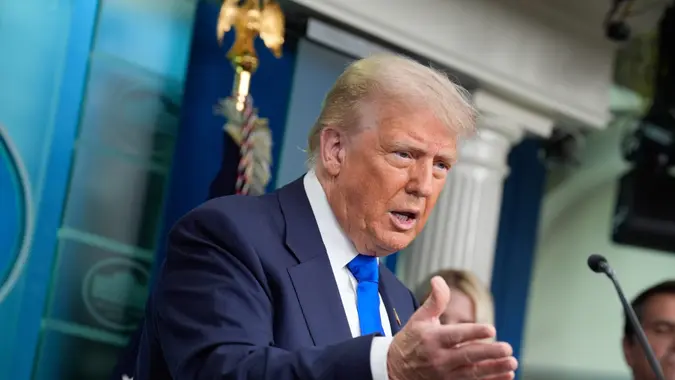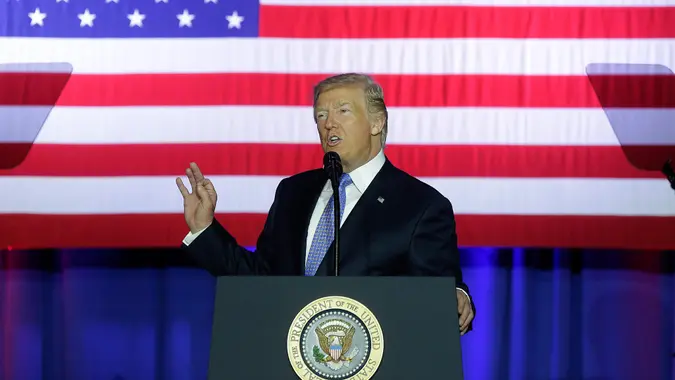2 Reasons Warren Buffett’s Tax Solution Would Help You Pay Less — and 3 Reasons It Wouldn’t

Commitment to Our Readers
GOBankingRates' editorial team is committed to bringing you unbiased reviews and information. We use data-driven methodologies to evaluate financial products and services - our reviews and ratings are not influenced by advertisers. You can read more about our editorial guidelines and our products and services review methodology.

20 Years
Helping You Live Richer

Reviewed
by Experts

Trusted by
Millions of Readers
Famed investor Warren Buffett recently floated a proposal at the 2024 Berkshire Hathaway Annual Meeting that could result in consumers not having to “pay a dime of federal taxes.”
Simply put, Buffett suggested that 800 other companies match Berkshire Hathaway’s federal tax contributions so everyone else wouldn’t have to contend with income taxes, Social Security taxes or estate taxes. Here are the ways which Buffett’s proposal works, but also how it doesn’t.
Works: The Math Adds Up
Berkshire Hathaway paid more than $5 billion in federal taxes to the U.S. government last year. If 800 other companies matched Berkshire Hathaway’s federal taxes, the government would receive approximately $4 trillion.
The federal government collected $4.5 trillion from taxpayers in fiscal 2023. Buffett’s proposal results in a $500 billion gap. Those 800 companies would have to pay roughly $5.6 billion each in federal taxes. Buffett recommended an elevated corporate tax so businesses that don’t quite make the cut for the top 800 companies can cover the $500 billion gap.
Doesn’t Work: False Assumptions Break the Premise
The thought of having 800 corporations pay $5 billion in corporate taxes each year sounds great for consumers. However, the United States does not have 800 corporations that generate more than $5 billion in annual profits, let alone 800 companies that have enough money to cover $5 billion in federal taxes each year.
For instance, Costco generated $7.37 billion in net income during fiscal 2024, a 52-week period that ended on September 1, 2024. While Costco could afford $5 billion in federal taxes, that represents a lofty 68% corporate tax rate.
It’s also important to note that Costco is the 17th largest corporation in the S&P 500. Moving further down the list, PayPal is the S&P 500’s 114th largest holding. The fintech company generated $4.25 billion in fiscal 2023.
According to Buffett’s proposal, a company that made $4.25 billion in profits would have to pay $5 billion in federal taxes. That math doesn’t work, and keep in mind that the S&P 500 includes corporations like Walgreens and Qorvo, which aren’t even profitable.
Works: Lower Taxes Are Still Better Than No Break at All
Corporate profits only reached $3.7 billion in the United States, which falls short of how much the government spent or earned that year. Buffett’s proposal still results in a higher corporate tax that would reduce the financial burden on consumers.
In theory, higher corporate taxes work. During her campaign, Vice President Harris proposed raising the corporate tax rate from 21% to 28%. Doing so would increase the government’s revenue from corporate taxes by 33%. Then, the government could reduce federal income taxes due to the boost from corporations.
Doesn’t Work: Higher Corporate Tax Rates Can Increase Inflation and Job Cuts
Another flaw of higher corporate taxes is that companies will find ways to circumvent them. Some corporations will go overseas to pay a lower tax rate on their profits. As more corporations go overseas, the government loses tax revenue, and it may have to tax consumers at higher rates to balance their books.
Companies that stay in the U.S. may have to raise prices on products and services while laying off more workers to compensate for higher taxes. A higher corporate tax rate can lead to more inflation, which is a silent tax. In addition, smaller companies may struggle with the elevated corporate tax rate and go out of business. A high corporate tax rate can stifle businesses in the U.S. and result in fewer entrepreneurs.
Doesn’t Work: The National Debt Will Continue To Grow
Higher interest rates have been taking a toll on U.S. debt, which continues to grow. Last year, the federal government spent $658 billion on interest payments — that’s a 38% year-over-year increase. Even if the growth rate decelerates, it’s still a significant portion of total spending.
Buffett’s proposal also falsely assumes that $4.5 trillion is enough to cover government spending. Even though the federal government collected $4.5 trillion from taxpayers, it spent roughly $6.2 trillion in the same year. That’s a $1.7 trillion deficit in fiscal 2023, which further compounds the existing debt. Corporate profits can’t cover government spending, and if nothing changes, those profits may not be enough to cover interest payments.
It could be argued that it doesn’t matter how much money you give to someone who is financially responsible. If you give a gambler more money, the gambler will gamble more money instead of saving it. The same principle applies to the federal government. A viable solution starts with reviewing government spending and trimming the fat rather than focusing the discussion on higher tax rates.
 Written by
Written by  Edited by
Edited by 
























